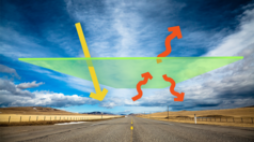The other day I had the pleasure of seeing Michael Nolan's new movie "Interstellar". I had been looking forward to this since I learned that the physicist Kip Thorne was "science consultant" for the movie and indeed was responsible for the original script idea. As an undergraduate I bought and attempted to read Misner, Thorne and Wheeler's Gravitation, a book about general relativity which seems large enough to generate a considerable amount of the force that it describes, and that book crystallized for me a fascination that had begun much earlier when I ran across the writings of Eddington. So, galaxy-hopping space travel through relativistic wormholes - what's not to like?
In fact, it is more the metaphysics than the physics that stuck in my mind. And I don't mean the stuff about time-traveling gravitational-wave messages sent by our future selves. Rather, the basic premiss: Earth is dying. Time to move on out. Our destiny is elsewhere. For the human beings of Interstellar it is true in the most literal sense that "this world is not (or is no longer) my home - I'm just passing through." The contrast between settler and nomad, between farmer and hunter, goes back to the dawn of civilization, and in Interstellar it gets set up once again before any of the characters have an inkling that a return to space is possible. "Some of us used to be looking to the stars", says Cooper, the hero, to his father-in-law, as they sit on the farmhouse porch and gaze across the acres of corn, the only crop that will still grow on a blighted Earth. "Now, we're just scratching in the dirt."
The distances between the stars are so vast that they are insurmountable by any technology that we can realistically conceive of constructing for ourselves. Interstellar gets round this problem by imagining that a shortcut through the fifth dimension has been constructed - and placed in orbit near to Saturn - by superhuman intelligences, "block beings" from the far future. But why are the "block beings" so determined to empower the old human fantasy of leaving Earth behind? Wouldn't it be easier for them to scatter the seeds of some blight-resistant crops right here on the home planet? Or are they perhaps - despite Interstellar's moving appeal to the power of love across generations scrambled by relativistic time-stretching - more turned on by the cold clean certainty of physics in a vacuum than by the messy reality of biology: of life in the dirt?
"No man" (or woman), wrote C.S.Lewis, "would discover an abiding strangeness on the Moon who could not already discover it in his own garden." That desire for the moon and the stars - Cooper's desire - has moved artists and scientists, authors and engineers, for millennia. When humanity is small and the world is vast, it perhaps does little harm to believe that we can always "move on". But in the age of the Anthropocene that same attitude is just a step away from a toxic Rapture fantasy. Does Interstellar avoid this danger? It certainly tries to, but I am not sure that it is wholly successful.
Yes, it's a movie, not a treatise. But, here in reality, as far as we know, there are no wormholes. There is no Planet B. Christ returns to rule and perfect this world, not to snatch us away from it.
Maybe it's time for some gardening. For a little dirt.





